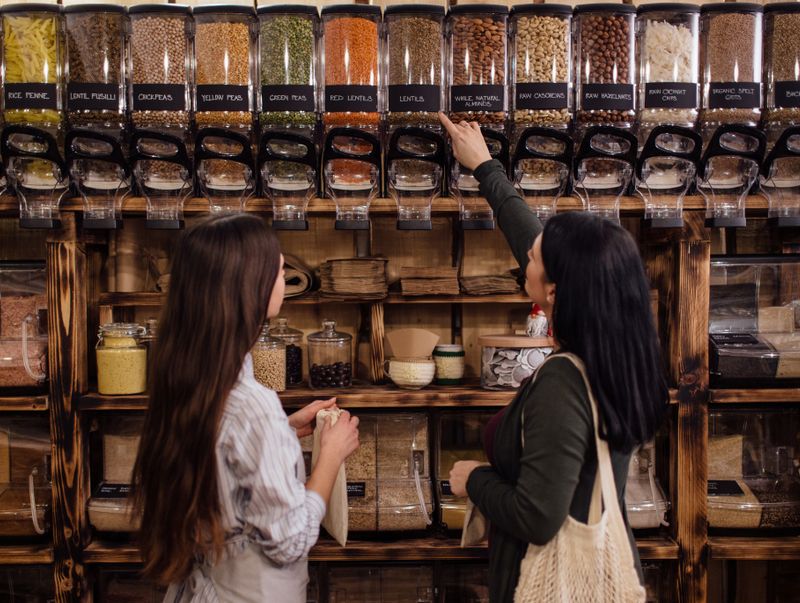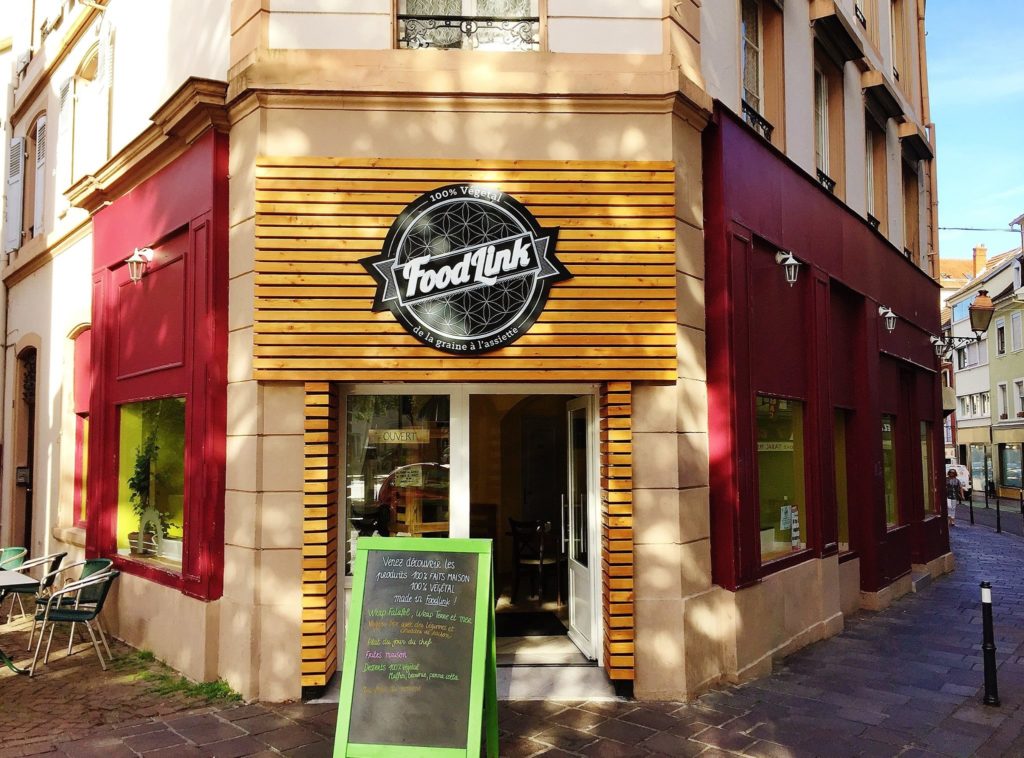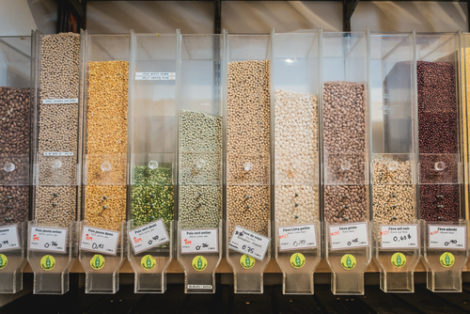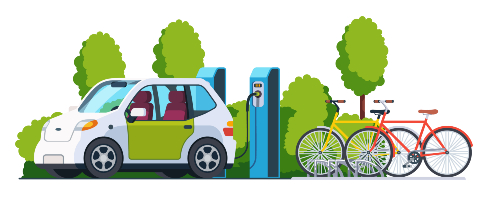
Many social movements point to our environmental footprint. To take the example of the city of Brussels: climate protests were organised once a week for several months in early 2019. Consumer behaviour is following this trend as more and more consumers are starting to shop in “zero waste” shops. Indeed, consumers are becoming more and more aware of their environmental footprint and their responsibilities in this respect, leading them to question the way they consume goods and services.
Contact us for our B2B studies

If you only have 30 seconds
- The first participant in the world market was Bulk Barn in Canada in 1982.
In Europe
- Europe’s first Bulk buying outlet was opened in London in 2007.
- The European Commission has stated that plastic packaging placed on the European market must be reusable or easily recyclable by 2030.
In France
- 400 outlets for Bulk buying
- The Bulk buying market increased by 41% between 2018 and 2019
- 1.2 billion euros in revenue in 2019
- 40% of French households make bulk purchases
- 5% in market share
In Belgium
- 300 organic/bulk/local outlets
- The majority of sales outlets are located in city centres.
In Germany
In 2015, research revealed that:
- 82% would be ready to buy without packaging
- 70% of respondents are not willing to pay more for these products
- 52% are willing to travel further
Summary
- Covid-19 and the bulk buying market
- Zero waste retailers
- The zero-waste Click and collect
- The zero-waste services

Covid-19 and the Bulk buying market
During the lockdown, only 22% of the French were Bulk buying (compared to 40% in normal times). According to research carried out in mid-May 2020 by Reseau Vrac involving 4,400 French households, here are the reasons for this:
- 42% because the shops and sales outlets were inaccessible
- 29% organised themselves differently to do their shopping during the lockdown (remember that the Click & Collect and home delivery services saw a significant increase in visits during the lockdown)
- 21% because they were not confident (during covid-19)
According to the same study, Bulk has indeed experienced a slowdown during the lockdown. Didier Onraita, co-founder of Day by day, the largest Bulk buying chain in France, nevertheless states that the brand has continued to grow with a turnover up on 2019.
While Bulk buying sales have slowed down, 75% of Belgian producers have seen their income increase or stabilise during the lockdown, a sign that consumers have begun to recommend short circuits. It should be noted, however, that this trend did not last, the situation was reversed again around June 2020 to return to the pre-crisis state.

The Bulk buying and zero waste retailers
Products purchased in bulk (ConsoGlobe)
- Oilseeds: 58% of households
- Dried fruits: 51%
- Pulses: 30%
- Seeds: 29%
- Cereals and rice: 25%
More and more shops and restaurants, regardless of their size, are buying from local producers. Many of them offer services such as Click and collect or home delivery, whether B2B or B2C, to sell their weekly products and all this without packaging.
 For example, the small vegan restaurant FoodLink, located in the centre of Mulhouse in France, offers dishes that are not only organic and vegan, but above all prepared with ingredients from the vegetable garden of the owners or neighbouring producers. Of course, some waste is still produced when packing sandwiches or dishes, but some retailers go a step further.
For example, the small vegan restaurant FoodLink, located in the centre of Mulhouse in France, offers dishes that are not only organic and vegan, but above all prepared with ingredients from the vegetable garden of the owners or neighbouring producers. Of course, some waste is still produced when packing sandwiches or dishes, but some retailers go a step further.
Where to Bulk buy?
- In shops specialising in the sale of products without packaging
- In the organic outlets (88% have a bulk buying department)
- In some of the equipped supermarkets
The trend is exploding, and shops are offering products without packaging are opening everywhere. However, it is essential to point out that these shops only represent a small share of the food sales market (5% in France, compared to 45% for organic outlets and 50% for traditional supermarkets).
The latter can be found under different names: zero-waste shops, bulk buying shops or naked products, but all have the same objective: to sell products without packaging and wrapping. You will find all the bulk buying retailers active on French territory here.
How does a “Bulk buying shop” operate?
Consumers bring their containers and serve themselves directly in the shop (pasta, lentils, fruit, vegetables, coffee, tea, and more). They weigh their purchases at the checkout and pay. When they come the next time, they will undoubtedly bring the same glass container and thus avoid producing waste.
 Gramm.genau in Frankfurt, Germany, is an excellent example of a zero-waste shop. The retailer offers many products (food, cosmetics, toiletries, household products and accessories) without any packaging. The structure has also opened a zero-waste café where dishes and cakes are sold without any packaging, all using a way of cooking that is intended to be waste-free. You will not find any plastic there.
Gramm.genau in Frankfurt, Germany, is an excellent example of a zero-waste shop. The retailer offers many products (food, cosmetics, toiletries, household products and accessories) without any packaging. The structure has also opened a zero-waste café where dishes and cakes are sold without any packaging, all using a way of cooking that is intended to be waste-free. You will not find any plastic there.
It is essential to note that zero-waste shops do not only offer food products without packaging. Most of them include in their offer a wide variety of household, toiletries and cosmetics products to match the lifestyle of their consumers. Larger retailers are also moving towards zero waste (e.g. supermarkets). For example, Lush – a brand known for its natural toiletries and cosmetics – opened a “naked shop” in Manchester in January 2019.
Shops without packaging in Belgium
Robuust, a Bulk buying outlet, opened its doors in 2013 in Antwerp (Belgium). Numerous shops (more than 300 to date) are also jumping on the bandwagon throughout Belgium. Read the “Bulk buying food” file published in 2015 by ERU asbl with the participation of Brussels Environment. It should be noted, however, that in 5 years, the situation has changed considerably.

The zero waste Click and collect
First of all, when it comes to take-away orders, many snack bars and other fast-food outlets are willing to fill a Tupperware container with their preparations rather than use food trays. You can certainly try this the next time you order a sandwich or ready meal from the bakery: bring your container.
Another initiative has been launched in the south-west of France, in Toulouse. This concept is called the “Naked drive” and was developed based on Bulk buying shops. The ‘Naked drive’ is a classic Click and collect: you order online, the team prepares your order, you drive to the collection point for your products and collect your order. The only significant difference with traditional Click and collects is that nothing is thrown away, the containers and packaging: nothing is thrown away. The products are stored in glass jars or other reusable containers. The ‘naked drive’ team takes care of getting all the containers you need for your first order. Of course, you can keep and reuse these containers, or bring them back to the ‘Naked drive’ the next time you visit, so that you can pick up a voucher. The team will then take care of cleaning the containers before putting them back into circulation.
Here again, you will find not only food and drinks but also a wide range of everyday items such as toiletries, cosmetics, household products, accessories and so on.

The zero-waste services
As far as services are concerned, it is a little more complicated to find zero waste as a common thread or marketing argument. However, companies in the Events sector that are oriented towards zero waste are in the process of standing out. We have all already noticed how events produce much waste, whether they are professional events, trade fairs, training courses or even birthdays, weddings and family reunions. The aim for these zero-waste event agencies is to ensure that the event in question is organised with the exact amount of furniture required and to ensure that purchasing, packaging and recycling are managed effectively to minimise the environmental footprint of the event.
Some service companies are also starting to promote their activities as zero waste. For example, these companies are offering zero-waste concierge services and venue management services. I’m not going to tell you that they are easy to find, but they do exist.
Illustrations: Shutterstock
Posted in Marketing.

